Contents
- Incumbents
- Events
- January-December
- Date Unknown
- Births
- Full date missing
- Deaths
- Full date missing 2
- See also
- References
| |||||
| Decades: | |||||
|---|---|---|---|---|---|
| See also: | Other events of 1470 History of France • Timeline • Years | ||||
Events from the year 1470 in France
| |||||
| Decades: | |||||
|---|---|---|---|---|---|
| See also: | Other events of 1470 History of France • Timeline • Years | ||||
Events from the year 1470 in France


Year 1470 (MCDLXX) was a common year starting on Monday of the Julian calendar.

Edward IV was King of England from 4 March 1461 to 3 October 1470, then again from 11 April 1471 until his death in 1483. He was a central figure in the Wars of the Roses, a series of civil wars in England fought between the Yorkist and Lancastrian factions between 1455 and 1487.

George Plantagenet, Duke of Clarence, was the sixth child and third surviving son of Richard Plantagenet, 3rd Duke of York, and Cecily Neville, and the brother of English kings Edward IV and Richard III. He played an important role in the dynastic struggle between rival factions of the Plantagenets now known as the Wars of the Roses.

Richard Neville, 16th Earl of Warwick, 6th Earl of Salisbury, known as Warwick the Kingmaker, was an English nobleman, administrator, landowner of the House of Neville fortune and military commander. The eldest son of Richard Neville, 5th Earl of Salisbury, he became Earl of Warwick through marriage, and was the wealthiest and most powerful English peer of his age, with political connections that went beyond the country's borders. One of the leaders in the Wars of the Roses, originally on the Yorkist side but later switching to the Lancastrian side, he was instrumental in the deposition of two kings, which led to his epithet of "Kingmaker".
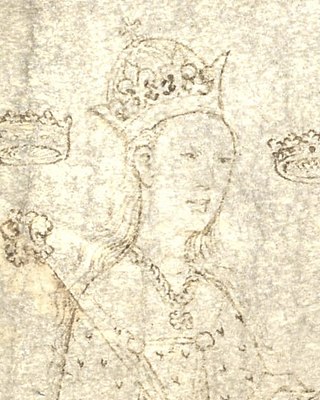
Anne Neville was Queen of England from 26 June 1483 until her death in 1485 as the wife of King Richard III. She was the younger of the two daughters and co-heiresses of Richard Neville, 16th Earl of Warwick, and Anne de Beauchamp. Before her marriage to Richard, she had been Princess of Wales as the wife of Edward of Westminster, Prince of Wales, the only son and heir apparent of King Henry VI.
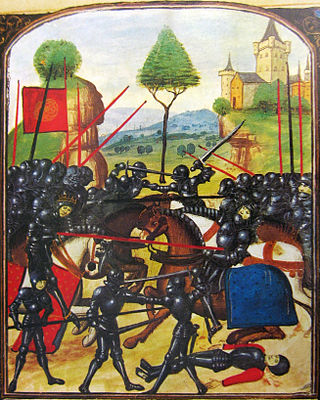
The Battle of Barnet was a decisive engagement in the Wars of the Roses, a dynastic conflict of 15th-century England. The military action, along with the subsequent Battle of Tewkesbury, secured the throne for Edward IV.

Margaret of York, also known by marriage as Margaret of Burgundy, was Duchess of Burgundy from 1468 to 1477 as the third wife of Charles the Bold, and after his death (1477) acted as a protector of the Burgundian State. She was a daughter of Richard, 3rd Duke of York, and of Cecily Neville, and the sister of two kings of England, Edward IV and Richard III. Born at Fotheringhay Castle, Northamptonshire, in the Kingdom of England, she died at Mechelen in the Low Countries.

Jean Balue was a French cardinal and minister of Louis XI. Born without resources, he managed to climb the political ladder by exploiting connections, to whom he often did not remain loyal, and by making himself an indispensable agent of the king's purposes in a time of political disorder in France. His services were as much military as ecclesiastical, bringing him the critical task of defending the city of Paris against the King's enemies. His work as a diplomat in dealing with Duke Francis of Brittany and with Charles de France brought him the office of first minister to the King. Balue overreached himself in negotiating a treaty between the King and Charles the Bold, who had become Duke of Burgundy and was trying to recover all his family inheritance. Secret correspondence revealed that he might have been playing both sides in the negotiation, and he was arrested, and held on charges of treason from 1469 to 1481, while King and Pope argued over jurisdiction. After the death of King Louis and Pope Sixtus, the new French king, Charles VIII, appointed Balue his ambassador in Rome.

Francis II was Duke of Brittany from 1458 to his death. He was the grandson of John IV, Duke of Brittany. A recurring theme in Francis' life would be his quest to maintain the quasi-independence of Brittany from France. As such, his reign was characterized by conflicts with King Louis XI of France and with his daughter, Anne of France, who served as regent during the minority of her brother, King Charles VIII. The armed and unarmed conflicts from 1465 to 1477 and 1484–1488 have been called the "War of the Public Weal" and the Mad War, respectively.
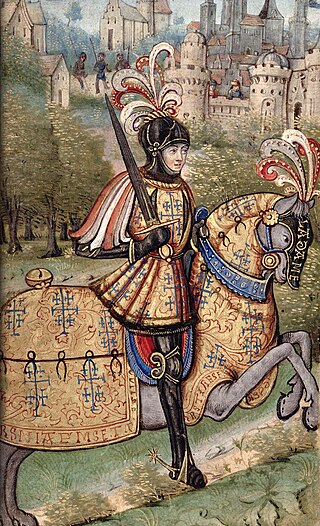
René II was Count of Vaudémont from 1470, Duke of Lorraine from 1473, and Duke of Bar from 1483 to 1508. He claimed the crown of the Kingdom of Naples and the County of Provence as the Duke of Calabria 1480–1493 and as King of Naples and Jerusalem 1493–1508. He succeeded his uncle John of Vaudémont as Count of Harcourt in 1473, exchanging it for the county of Aumale in 1495. He succeeded as Count of Guise in 1504.

Lady Isabel Neville was the elder daughter and co-heiress of Richard Neville, 16th Earl of Warwick, and Anne de Beauchamp, suo jure 16th Countess of Warwick. She was the wife of George Plantagenet, 1st Duke of Clarence. She was also the elder sister of Anne Neville, wife and consort of Clarence's brother, Richard III.

The House of Plantagenet was a royal house which originated from the French county of Anjou. The name Plantagenet is used by modern historians to identify four distinct royal houses: the Angevins, who were also counts of Anjou; the main line of the Plantagenets following the loss of Anjou; and the Houses of Lancaster and York, two of the Plantagenets cadet branches. The family held the English throne from 1154, with the accession of Henry II, until 1485, when Richard III died.
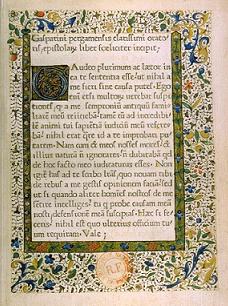
Johann Heynlin, variously spelled Heynlein, Henelyn, Henlin, Hélin, Hemlin, Hegelin, Steinlin; and translated as Jean à Lapide, Jean La Pierre , Johannes Lapideus, Johannes Lapidanus, Johannes de Lapide was a German-born scholar, humanist and theologian, who introduced the first printing press in France (Paris) in 1470.

Guillaume Fichet was a French scholar, who cooperated with Johann Heynlin to establish the first printing press in France (Paris) in 1470.

Le Petit-Bornand-les-Glières, commonly referred to as Petit-Bornand, is a former commune in the Haute-Savoie department in the Auvergne-Rhône-Alpes region in south-eastern France. On 1 January 2019, it was merged with its neighbour village Entrement to form the new commune of Glières-Val-de-Borne.
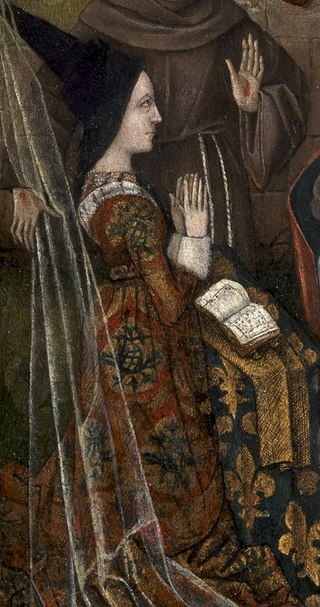
Charlotte of Savoy was Queen of France as the second spouse of Louis XI. She served as regent during the king's absence in 1465, and was a member of the royal regency council during her son's minority in 1483.
Events from the 1470s in England.

The Readeption was the restoration of Henry VI of England to the throne of England in 1470. Edward, Duke of York, had taken the throne as Edward IV in 1461. Henry had fled with some Lancastrian supporters and spent much of the next few years in hiding in Northern England or in Scotland, where there was still some Lancastrian support. Henry was captured in 1465 and was held as a prisoner in the Tower of London. Following dissent with his former key supporter, Richard Neville, 16th Earl of Warwick, Edward was forced to flee in 1470. Henry was then restored to the throne, although he was deposed again the following year.
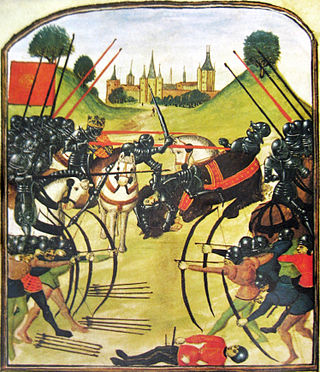
The Wars of the Roses, known at the time and in following centuries as the Civil Wars, were a series of civil wars fought over control of the English throne from 1455 to 1487. The wars were fought between supporters of the House of Lancaster and House of York, two rival cadet branches of the royal House of Plantagenet. The conflict resulted in the end of Lancaster's male line in 1471, leaving the Tudor family to inherit their claim to the throne through the female line. Conflict was largely brought to an end upon the union of the two houses through marriage, creating the Tudor dynasty that would subsequently rule England.
The Treaty of London was an agreement between Charles the Bold of Burgundy and Edward IV of England signed on 25 July 1474. In the treaty, Charles agreed to support England militarily during an invasion of France, and to recognise Edward as the King of France.